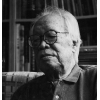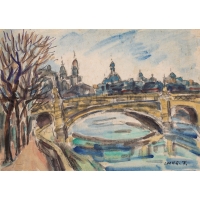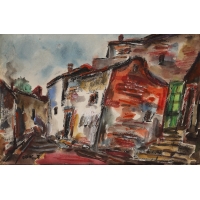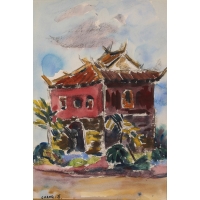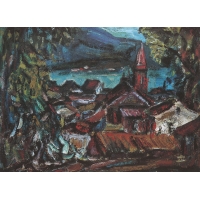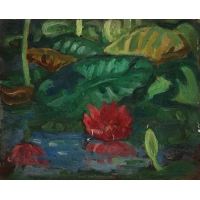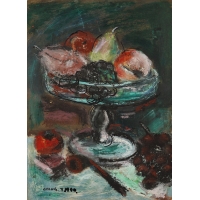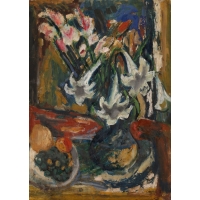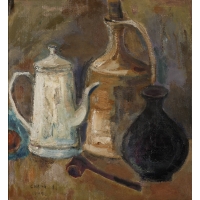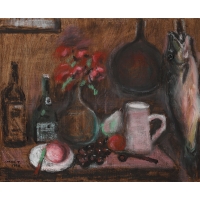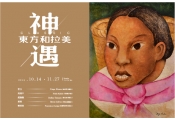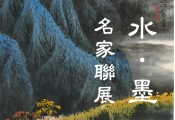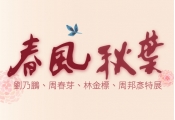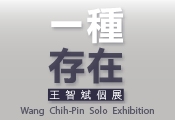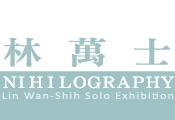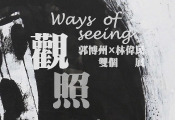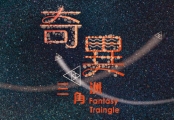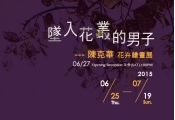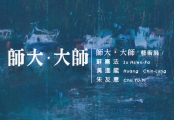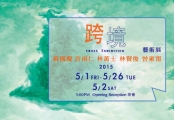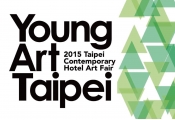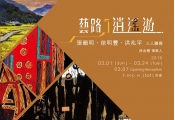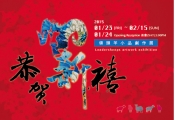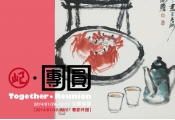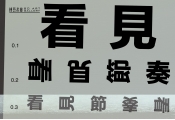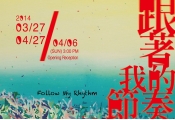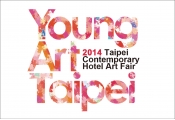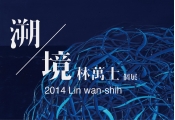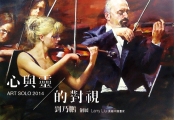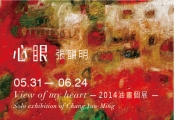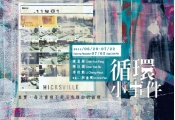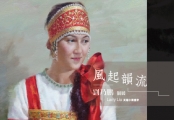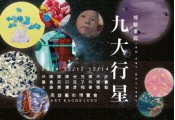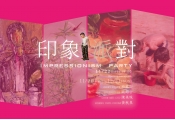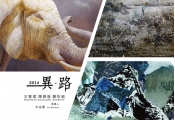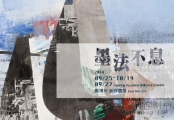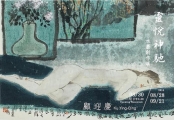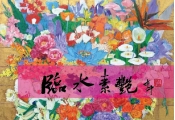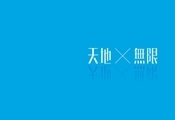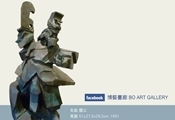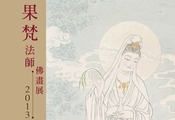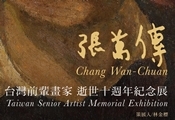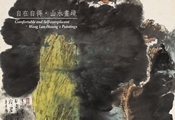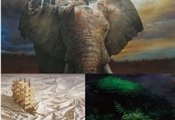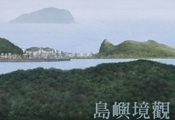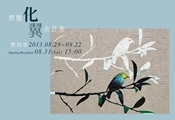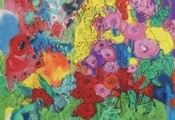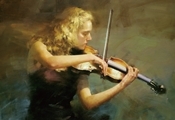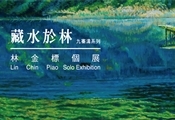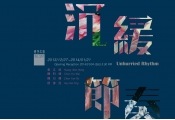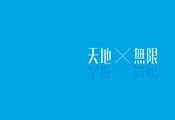Artists
Chang Wan-Chuan
Chang Wan Chuan arrived at his unique artistic style by blending his own creative ideas into initial inspirations from the Fauvists. “Depiction from life” has been his consistent approach to painting, and so his painting features bold lines that convey a sense of speed, wildly shifting momentum, and deep, thick colors. Through this untrammeled quality, a humanistic glow is revealed, and even the sense of drifting through vast stretches of time. He prefers whites, yellow, blues, and reds with black outlines. The colors are thickly mixed. He never cleans his brushes and palette, and the black that he often uses enhances stability and emphasizes the expression of his own personality.
Chang Wan Chuan, a man of brilliant personality and unique artistic accomplishment, is one of the leading representatives of Taiwan’s first generation of artists. He was born in 1909 and died in 2003 at the age of 95.
1909 Born in Danshuei, Taipei Country to Chang Yong-Ching, a customs officer at Danshuei.
1924 Graduates from one year high school program at Shilin Public School (original name: Pattsiran Public School).
1927 Joins Ishikawa Kinichiro’s Taiwan Watercolor Society and participates in the group’s first show in November.
1929 Joins Ni Chiang-Huai’s Taiwanese Art Institute (later named Modern Art Institute of Taiwan).
1930 Attends Tokyo Kawabata Private Art School and Hongo Art Institute in Japan with Hung Rui-Lin and
Chen Te- Wang to study western painting and drawing. While there, resides with Chen Chin –Chi,
Li Mei-Shu and Li Shih-Chiao.Work Taiwan Landscape selected for The First Art Exhibition.Meets painter
Toho Shiotsuki, his painting style gradually moves towards Fauvism.
1931 Admitted into the Teikoku Art School along with Hung Rui-Lin and Chen Te-Wang.
1932 Leaves the Teikoku Art School and studies at Tokyo Kawabata Private Art School.
Visits his relatives in Xiamen during a holiday and meets art student Xie Guo-Yong.
His work Temple Market is chosen for the sixth Taiwan Fine Art Exhibition.
1936 Joins the Taiyang Art Association along with Hung Rui-Lin and Chen Te-Wang. Exhibits in the second
Taiyang Art Exhibition.
1937 Travels in Guangdong and goes back to Xiamen.
Organizes Qingtian Painting Society with Xiamen Painting Academy graduate Xu Sheng-Ji (Lu Chi-Cheng).
Exhibits in the third Taiyang Art Exhibition.
1938 Organizes the Mouve Artist Society with Hung Rui-Lin, Chen Te-Wang, Xu Sheng-Ji, Chen Chun-De and
Huang Ching-Cheng. Is invited to teach at the Xiamen Art School by Principal Lin Ko-Kung.
Leaves the Taiyang Art Association at the same times as Hung Rui-Lin and Chen Te-Wang.
His painting Scenery at Gulangyu is chosen for the first Taiwan Government Fine Art Exhibition.
1939 Returns to Taiwan and works at Ni Jiang-Huai’s mine Ruifang. His painting Church at Gulangyu is chosen
for the second Taiwan Government Fine Art Exhibition.
1941 After the Mouve Artists Society changes its name to the Taiwan Creative Art From Association it holds an exhibition
in Taipei, new members include Yen Shui-Long, Lan Yun-Teng, Fan Zhuo-Zao and Xie Guo-Yong. With the
addition of crafts and design, the Association becomes an integrated art group.
1942 The Japanese government in Taiwan puts into effect laws restricting art supplies, resulting in the use of straw
board in place of canvas for painting.
Taiwan Creative Art Form Association holds exhibition in Nostalgia Teahouse. From this point on, fish become a common
theme in Chang’s painting. His painting A View of Xiamen is chosen for the fifth Taiwan Government Fine Art Exhibition.
1943 His painting Southern Landscape is chosen for the sixth Taiwan Government Fine Art Exhibition.
1944 Enlists in the army and paints military subjects.
1945 Father passes away and one of his younger brothers is killed in action in the South Pacific.
Called back home to care for family.
1946 Appointed instructor at Taipei Municipal Jianguo High School and reorganizes the football team.
1947 228 Incident erupts. Leaves Jianguo High School and flees to the Jinshan district to live with his younger brother
who is a doctor. Fishes for sustenance and meets Miss Hsu Bao-Yue.
1948 Works as an art teacher at Datong High School.
1949 Marries Hsu Bao-Yue.
1950 Takes a second job at Yanping School.
1951 Takes up the post of training director at Datong High School. Coaches the school football team.
1952 Once again joins Taiyang Art Association.
1954 Organizes the Era Fine Art Association with Hung Rui-Lin, Chang Yi-Hsiung, Liao Te-Cheng, Chin Jun-Tso and holds the
Society’s first exhibition at the Rose Marie Art Gallery on Boai Road in Taipei.
1955 Once again leaves Taiyang Art Association.
1958 Mother passes away.
1964 Employed in the evening division of the National Taiwan University of the Arts.
1966 Returns to Japan for the first time since the end of World War II. Holds solo exhibition in Sendai, Kagoshima in August.
1971 Holds solo exhibition in June at Zhongshan Hall, Taipei.
1972 Chang Wan-Chuan’s much admired good friend Hung Rui-Lin retires. Chang Wan-Chuan follows his steps, retires from
Datong High School.
1975 Takes leave of posts at Yanping Middle School and National Taiwan University of the Arts. Travels to France and
stays along the Seine River to concentrate on his painting.
1976 Travels from Paris to Madrid, and then Tome and Venice.
1977 Returns to Taiwan. Rents a studio on Zhongxiao East Road and concentrates on oil painting based on his trip to Europe.
Holds his European Travel Exhibition at the National Taiwan Museum in November, exhibiting over 70 still-life and
landscape paintings inspired by Spain, France, Italy, Thailand and Hong Kong.
1979 Visits Japan and the United States. Visits eldest son who lives abroad. Travels to many cities in Mexico and
fills three sketchbooks.
1983 Attends Picasso exhibition in Japan. Travels to Tokyo, Kyoto and Fukuoka.
1985 North American Taiwan Association invites Chang to visit the United States.
1990 Participates in the Taipei Fine Arts Museum exhibition Retrospective of Western Art – the Early Period in Taiwan. Visits
Europe to attend Vincent Van Gogh Retrospective at the Van Gogh Museum in Amsterdam.
1996 Has cataract surgery.
1997 89 years old. Has solo retrospective exhibition at the Taipei Fine Arts Museum, Chang Wan-Chuan’ A Retrospective.
2000 Suffers a mild stroke, but still retains mental clarity.
2003 95 years old. Passes away of old age at home on January 12.
Reference:
Taiwan Fine Arts Series 25 – Chang Wan-Chuan (Artist Publishing Co.)
Remembering the White Building in Danshuei (Cultural Affairs Bureau, Taipei Country)
1924 Graduates from one year high school program at Shilin Public School (original name: Pattsiran Public School).
1927 Joins Ishikawa Kinichiro’s Taiwan Watercolor Society and participates in the group’s first show in November.
1929 Joins Ni Chiang-Huai’s Taiwanese Art Institute (later named Modern Art Institute of Taiwan).
1930 Attends Tokyo Kawabata Private Art School and Hongo Art Institute in Japan with Hung Rui-Lin and
Chen Te- Wang to study western painting and drawing. While there, resides with Chen Chin –Chi,
Li Mei-Shu and Li Shih-Chiao.Work Taiwan Landscape selected for The First Art Exhibition.Meets painter
Toho Shiotsuki, his painting style gradually moves towards Fauvism.
1931 Admitted into the Teikoku Art School along with Hung Rui-Lin and Chen Te-Wang.
1932 Leaves the Teikoku Art School and studies at Tokyo Kawabata Private Art School.
Visits his relatives in Xiamen during a holiday and meets art student Xie Guo-Yong.
His work Temple Market is chosen for the sixth Taiwan Fine Art Exhibition.
1936 Joins the Taiyang Art Association along with Hung Rui-Lin and Chen Te-Wang. Exhibits in the second
Taiyang Art Exhibition.
1937 Travels in Guangdong and goes back to Xiamen.
Organizes Qingtian Painting Society with Xiamen Painting Academy graduate Xu Sheng-Ji (Lu Chi-Cheng).
Exhibits in the third Taiyang Art Exhibition.
1938 Organizes the Mouve Artist Society with Hung Rui-Lin, Chen Te-Wang, Xu Sheng-Ji, Chen Chun-De and
Huang Ching-Cheng. Is invited to teach at the Xiamen Art School by Principal Lin Ko-Kung.
Leaves the Taiyang Art Association at the same times as Hung Rui-Lin and Chen Te-Wang.
His painting Scenery at Gulangyu is chosen for the first Taiwan Government Fine Art Exhibition.
1939 Returns to Taiwan and works at Ni Jiang-Huai’s mine Ruifang. His painting Church at Gulangyu is chosen
for the second Taiwan Government Fine Art Exhibition.
1941 After the Mouve Artists Society changes its name to the Taiwan Creative Art From Association it holds an exhibition
in Taipei, new members include Yen Shui-Long, Lan Yun-Teng, Fan Zhuo-Zao and Xie Guo-Yong. With the
addition of crafts and design, the Association becomes an integrated art group.
1942 The Japanese government in Taiwan puts into effect laws restricting art supplies, resulting in the use of straw
board in place of canvas for painting.
Taiwan Creative Art Form Association holds exhibition in Nostalgia Teahouse. From this point on, fish become a common
theme in Chang’s painting. His painting A View of Xiamen is chosen for the fifth Taiwan Government Fine Art Exhibition.
1943 His painting Southern Landscape is chosen for the sixth Taiwan Government Fine Art Exhibition.
1944 Enlists in the army and paints military subjects.
1945 Father passes away and one of his younger brothers is killed in action in the South Pacific.
Called back home to care for family.
1946 Appointed instructor at Taipei Municipal Jianguo High School and reorganizes the football team.
1947 228 Incident erupts. Leaves Jianguo High School and flees to the Jinshan district to live with his younger brother
who is a doctor. Fishes for sustenance and meets Miss Hsu Bao-Yue.
1948 Works as an art teacher at Datong High School.
1949 Marries Hsu Bao-Yue.
1950 Takes a second job at Yanping School.
1951 Takes up the post of training director at Datong High School. Coaches the school football team.
1952 Once again joins Taiyang Art Association.
1954 Organizes the Era Fine Art Association with Hung Rui-Lin, Chang Yi-Hsiung, Liao Te-Cheng, Chin Jun-Tso and holds the
Society’s first exhibition at the Rose Marie Art Gallery on Boai Road in Taipei.
1955 Once again leaves Taiyang Art Association.
1958 Mother passes away.
1964 Employed in the evening division of the National Taiwan University of the Arts.
1966 Returns to Japan for the first time since the end of World War II. Holds solo exhibition in Sendai, Kagoshima in August.
1971 Holds solo exhibition in June at Zhongshan Hall, Taipei.
1972 Chang Wan-Chuan’s much admired good friend Hung Rui-Lin retires. Chang Wan-Chuan follows his steps, retires from
Datong High School.
1975 Takes leave of posts at Yanping Middle School and National Taiwan University of the Arts. Travels to France and
stays along the Seine River to concentrate on his painting.
1976 Travels from Paris to Madrid, and then Tome and Venice.
1977 Returns to Taiwan. Rents a studio on Zhongxiao East Road and concentrates on oil painting based on his trip to Europe.
Holds his European Travel Exhibition at the National Taiwan Museum in November, exhibiting over 70 still-life and
landscape paintings inspired by Spain, France, Italy, Thailand and Hong Kong.
1979 Visits Japan and the United States. Visits eldest son who lives abroad. Travels to many cities in Mexico and
fills three sketchbooks.
1983 Attends Picasso exhibition in Japan. Travels to Tokyo, Kyoto and Fukuoka.
1985 North American Taiwan Association invites Chang to visit the United States.
1990 Participates in the Taipei Fine Arts Museum exhibition Retrospective of Western Art – the Early Period in Taiwan. Visits
Europe to attend Vincent Van Gogh Retrospective at the Van Gogh Museum in Amsterdam.
1996 Has cataract surgery.
1997 89 years old. Has solo retrospective exhibition at the Taipei Fine Arts Museum, Chang Wan-Chuan’ A Retrospective.
2000 Suffers a mild stroke, but still retains mental clarity.
2003 95 years old. Passes away of old age at home on January 12.
Reference:
Taiwan Fine Arts Series 25 – Chang Wan-Chuan (Artist Publishing Co.)
Remembering the White Building in Danshuei (Cultural Affairs Bureau, Taipei Country)
Preview

